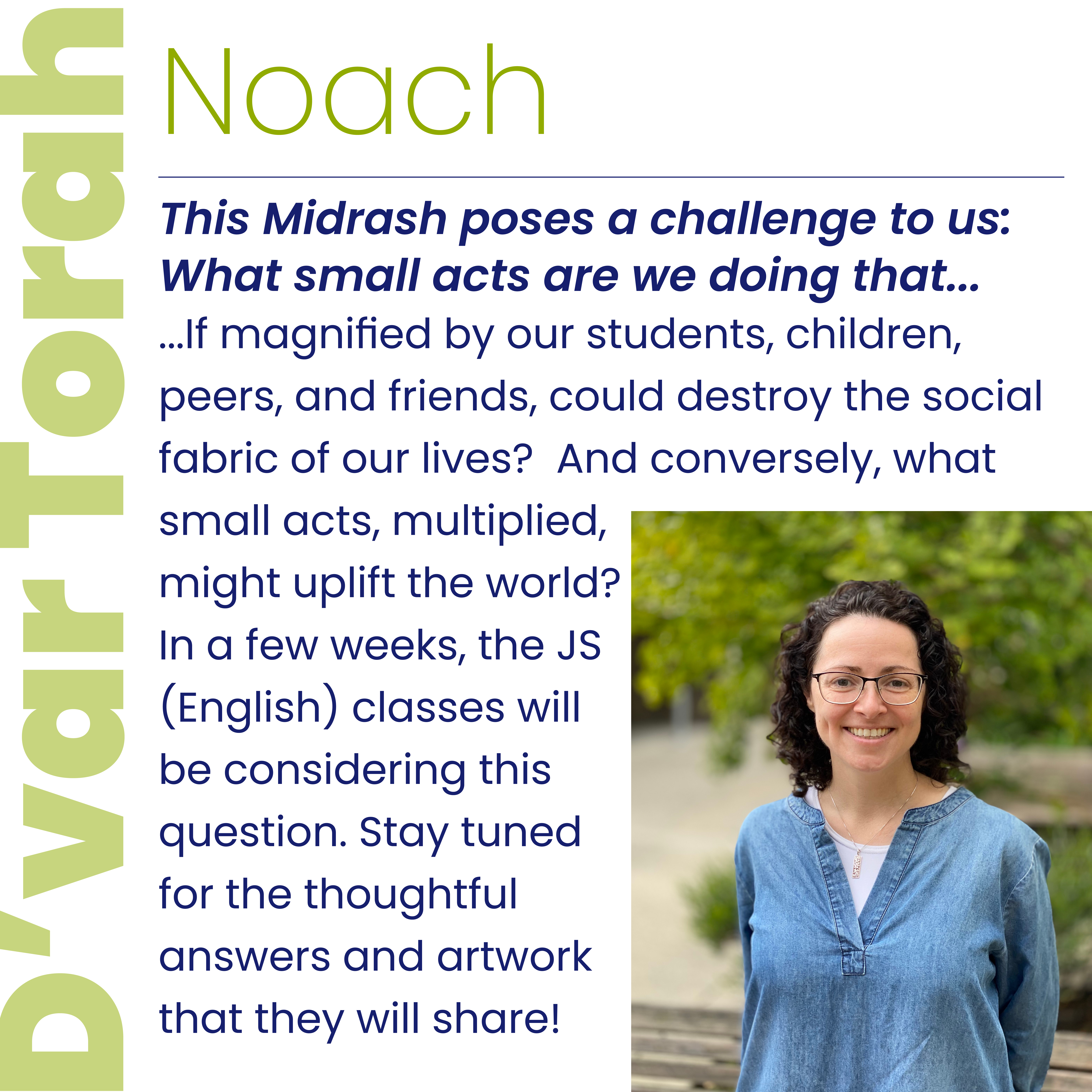Maybe Don’t Pick That Lupine: Reflections on Noah’s Flood
Raizy Lichtenstein, Jewish Studies Teacher
Ancient flood narratives and myths abound: Mesopotamian, Greek, Norse, Native American, Chinese and Aboriginal stories tell of an early flood from which the earth and/or humanity emerged or was renewed. Every culture tells the story differently and ascribes a different meaning to it. How the Torah tells the story – and how we have filled in the missing details – reveals a lot about Jewish values.
What caused the flood?
The Jewish Bible, in this week’s Torah portion of Noah, offers this dramatic pronouncement:
(ה) וַיַּ֣רְא ה’ כִּ֥י רַבָּ֛ה רָעַ֥ת הָאָדָ֖ם בָּאָ֑רֶץ וְכׇל־יֵ֙צֶר֙ מַחְשְׁבֹ֣ת לִבּ֔וֹ רַ֥ק רַ֖ע כׇּל־הַיּֽוֹם׃ (ו) וַיִּנָּ֣חֶם ה’ כִּֽי־עָשָׂ֥ה אֶת־הָֽאָדָ֖ם בָּאָ֑רֶץ וַיִּתְעַצֵּ֖ב אֶל־לִבּֽוֹ׃ (ז) וַיֹּ֣אמֶר ה’ אֶמְחֶ֨ה אֶת־הָאָדָ֤ם אֲשֶׁר־בָּרָ֙אתִי֙ מֵעַל֙ פְּנֵ֣י הָֽאֲדָמָ֔ה מֵֽאָדָם֙ עַד־בְּהֵמָ֔ה עַד־רֶ֖מֶשׂ וְעַד־ע֣וֹף הַשָּׁמָ֑יִם כִּ֥י נִחַ֖מְתִּי כִּ֥י עֲשִׂיתִֽם׃
And the Lord saw that the evil of the human creature was great on the earth and that every scheme of his heart’s devising was only perpetually evil. And the Lord regretted having made the human on earth and was grieved to the heart. And the Lord said, “I will wipe out the human race I created from the face of the earth, from human to cattle to crawling thing to the fowl of the heavens, for I regret that I have made them. (Genesis 6:5-7, Translated by Robert Alter)
The nature of the evil that inspires the Flood is not specified, and the verses that follow do little to clear up this confusion:
(יא) וַתִּשָּׁחֵ֥ת הָאָ֖רֶץ לִפְנֵ֣י הָֽאֱלֹקִ֑ים וַתִּמָּלֵ֥א הָאָ֖רֶץ חָמָֽס׃ (יב) וַיַּ֧רְא אֱלֹקִ֛ים אֶת־הָאָ֖רֶץ וְהִנֵּ֣ה נִשְׁחָ֑תָה כִּֽי־הִשְׁחִ֧ית כׇּל־בָּשָׂ֛ר אֶת־דַּרְכּ֖וֹ עַל־הָאָֽרֶץ׃
“And the earth was corrupt before God and the earth was filled with outrage. And God saw the earth and, look, it was corrupt, for all of flesh had corrupted its ways on the earth.” (Genesis 6:12-13, Translated by Robert Alter)
Evil and corruption: what exactly did people do to earn this flood of umbrage? As you can imagine, the classical commentators on this verse suggest a variety of social ills. Interestingly, one of the earliest extant commentaries on this verse, the Midrash Rabbah, an Aggadic text (~300-500 c.e.), suggests something shockingly modest:
“Corruption” is stealing something worth less than a coin. This is what the people of the generation of the Flood would do: when a seller brought out a basket of lupines for sale, a person would grab less than a coin’s worth of lupines from his basket, and then another would do the same, making sure to steal under the limit of what the shopkeeper could legally prosecute him in court for. [In this way, people were left destitute but with no recourse to the law]. (Midrash Bereishit Rabbah 31:5)
This Midrash highlights the last act we might think of as flood-worthy: taking just a few lupines from a seller’s basket, or perhaps “foraging” them from a neighbor’s property. It’s an act that, on its own, is too negligible to notice, let alone prosecute, but if enough people take enough seeds, the result is destitution or – at the very least – a diminished sense of social well-being.
This Midrash poses a challenge to us: What small acts are we doing that, if magnified by our students, children, peers, and friends, could destroy the social fabric of our lives? And conversely, what small acts, multiplied, might uplift the world? In a few weeks, the JS (English) classes will be considering this question. Stay tuned for the thoughtful answers and artwork that they will share!










